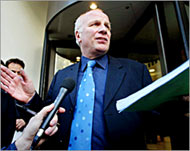BBC letter to Blair reopens row
A row between the UK government and the BBC has again intensified after the publishing of a letter from the former BBC chief to Tony Blair attacking the way his office handled news.

The 10-month-old personal letter was published on Saturday. In it, former director general Greg Dyke complained to Blair that Downing Street had often denied stories which later turned out to be true.
He singled out Alistair Campbell, Downing Street’s former communications chief, for criticism.
“On many occasions in my time as director general, the Downing Street press office under Mr Campbell denied stories that later turned out to be true,” said Dyke’s letter, dated 21 March last year and published for the first time in The Sunday Times.
“I can list half a dozen,” Dyke wrote. “There was never a certainty that a denial from the government director of information meant the story wasn’t true.”
“It often meant the Downing Street press office simply didn’t want it reported,” the letter said.
Opening wounds
Publication of Dyke’s earlier complaint threatens to reopen wounds over Lord Brian Hutton’s report, after both Blair and the BBC’s new management declared their intention to draw a line under the past.
 |
|
Director general Greg Dyke |
The BBC said the letter had not been considered admissible to the Hutton inquiry.
Hutton’s rejection of the letter – which would have highlighted the undue pressure by the government on the BBC in general – will cast further doubt on the judge’s findings, which have already been widely denounced as a “whitewash”.
Unease over the report – which many had hoped would look further into whether the intelligence did justify Blair’s case for war in Iraq – is significant, stirring protests outside Downing Street and sending government popularity into a nosedive in polls.
While Hutton criticised the BBC for lax editorial supervision and failing to respond to Downing Street’s strident demands for the BBC to retract its allegations, he also concluded that the report was “unfounded”, and that Blair and his government were largely innocent of wrongdoing.
Blair damaged
Despite his vindication, Blair’s reputation has been damaged in the eyes of most British voters according to an ICM poll published on Saturday.
Thirty percent of those surveyed in the poll – published in the News of the World weekly – thought Blair’s position had been seriously damaged, and a further 24% said it had suffered slightly.
|
“On many occasions in my time as director general, the Downing Street press office under Mr Campbell denied stories that later turned out to be true” Greg Dyke, |
Only 14% thought his status had improved.
Antiwar protesters were seen on Saturday burning a copy of the 700-page document at a demonstration outside Downing Street.
The poll also said the BBC had lost public confidence, with 56% of people – up 40% from a similar survey in October – now felt they should not have to pay a BBC licence fee.
A survey in The Times on Friday likewise showed Blair and the government had been damaged almost as much as the BBC by the inquiry.
Kelly, an internationally respected former UN arms expert, took his life in July last year just days being exposed by the government as the source of the BBC report alleging the government had “sexed up” its Iraq dossier.